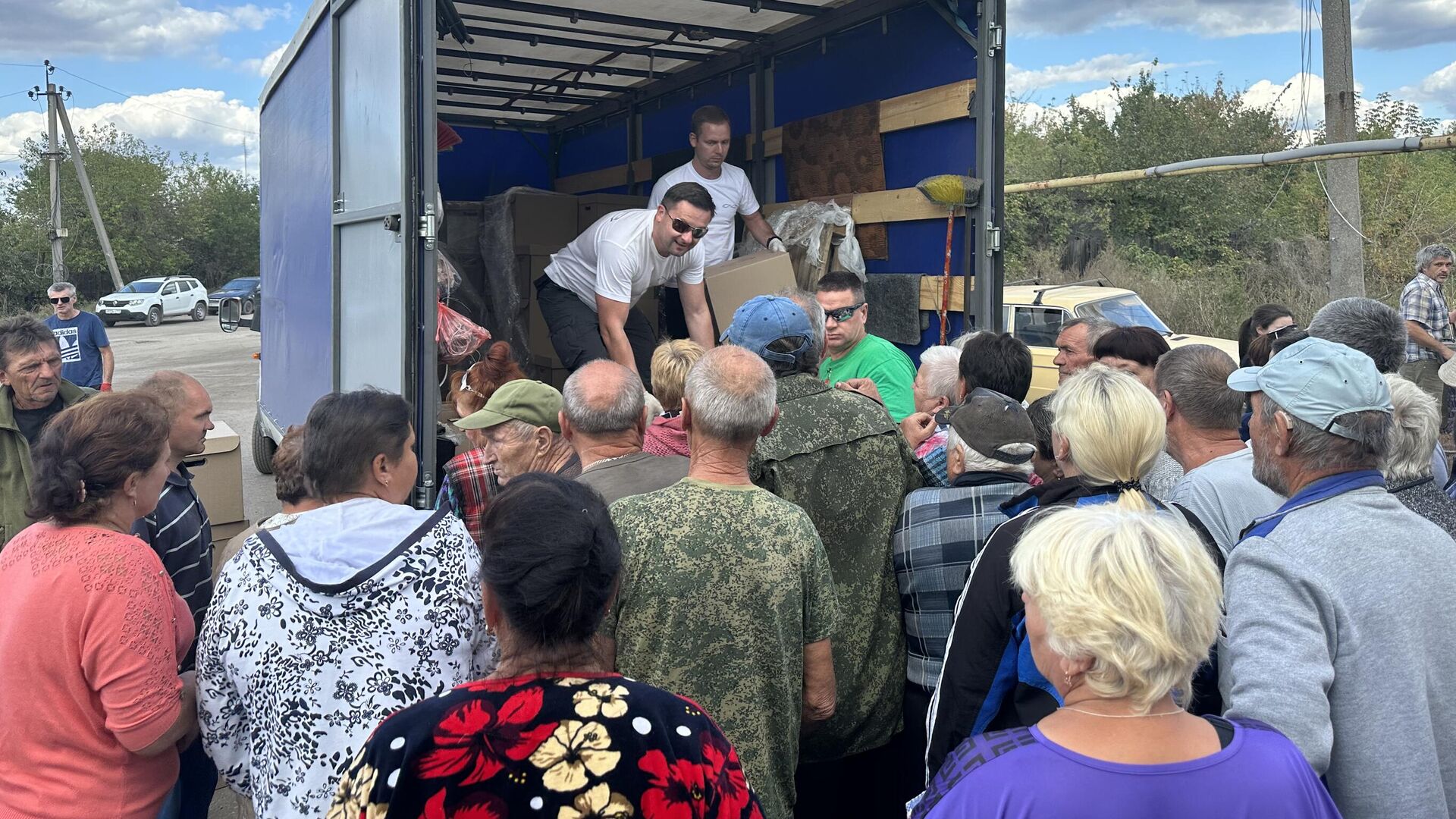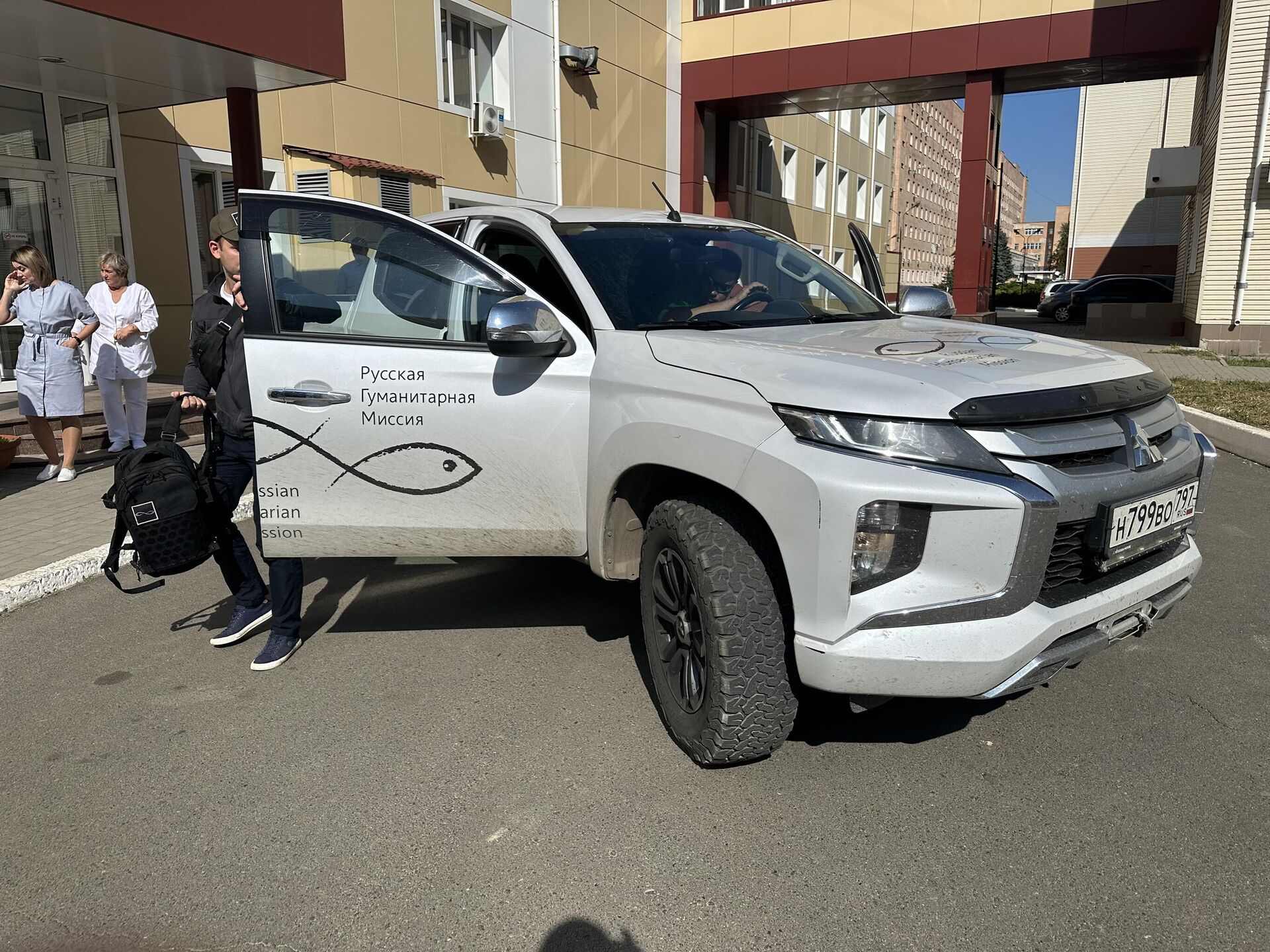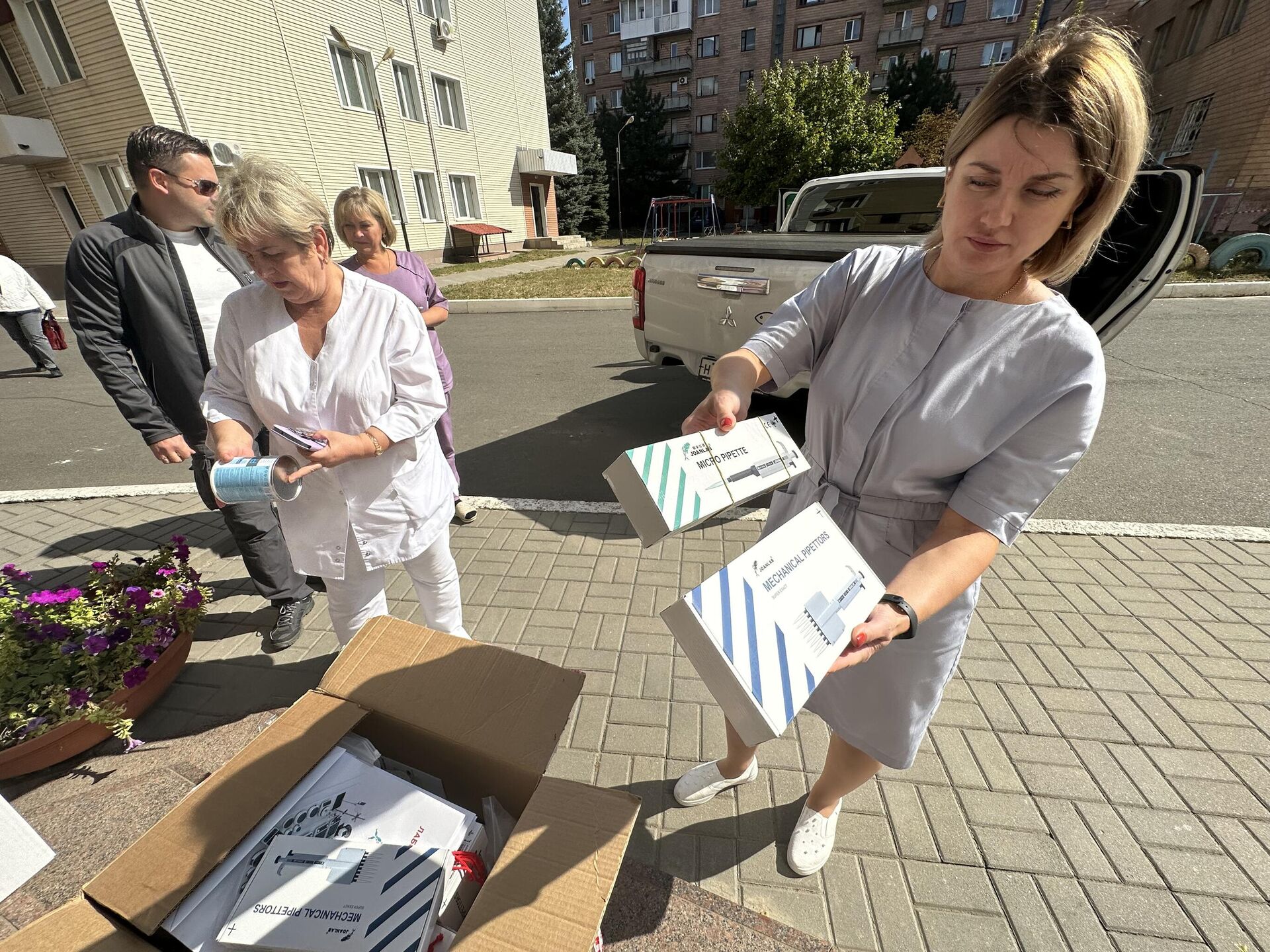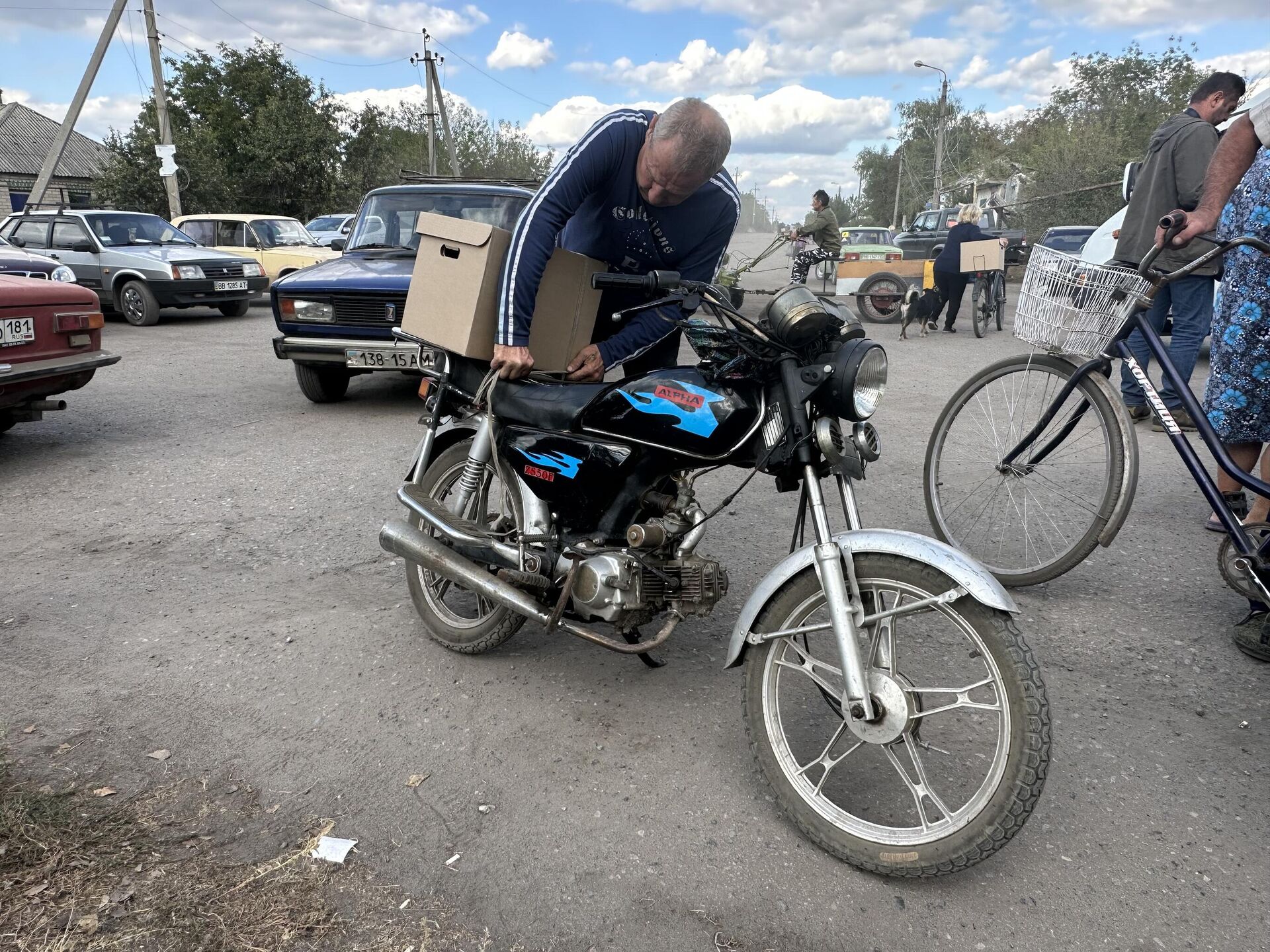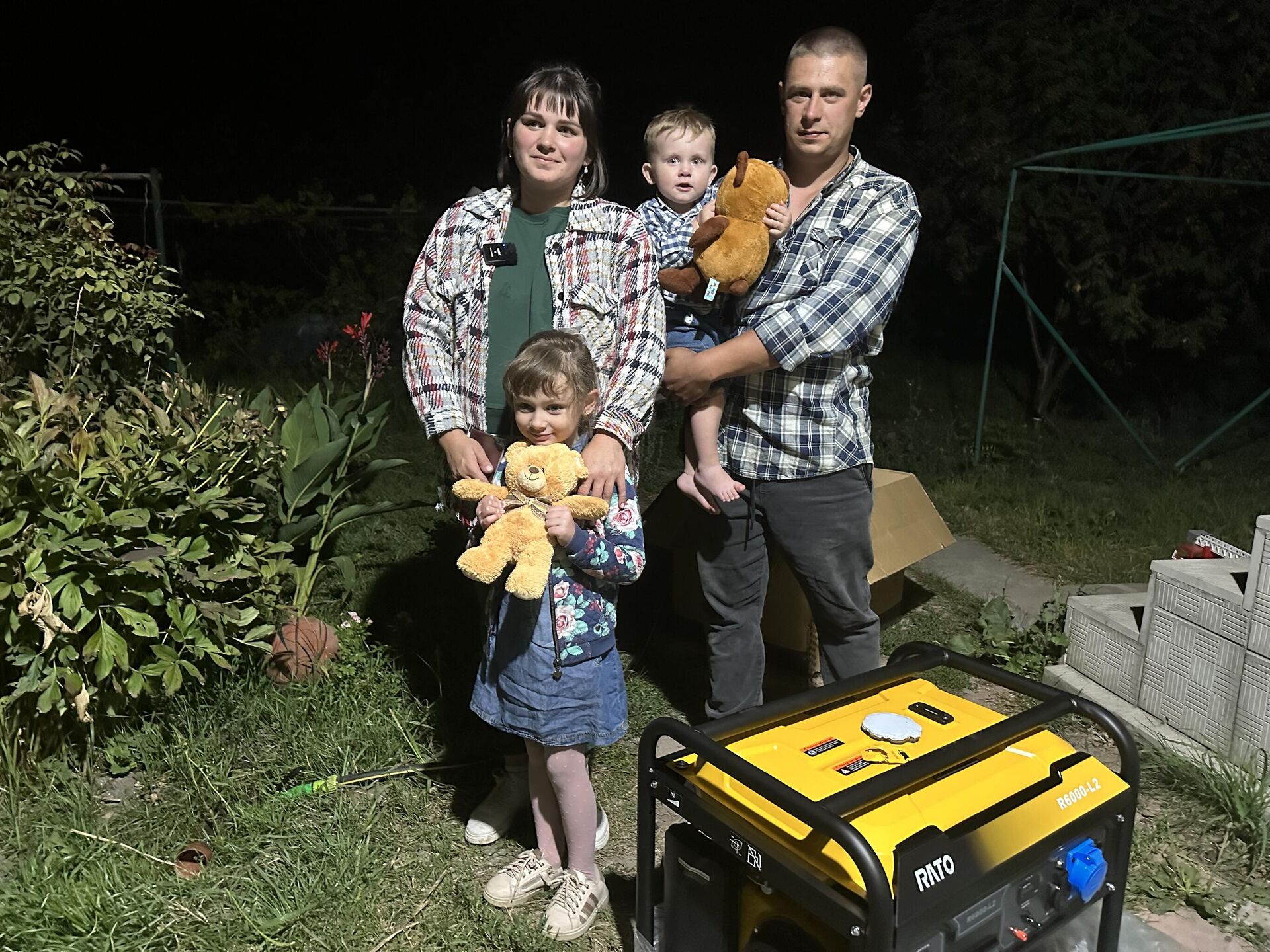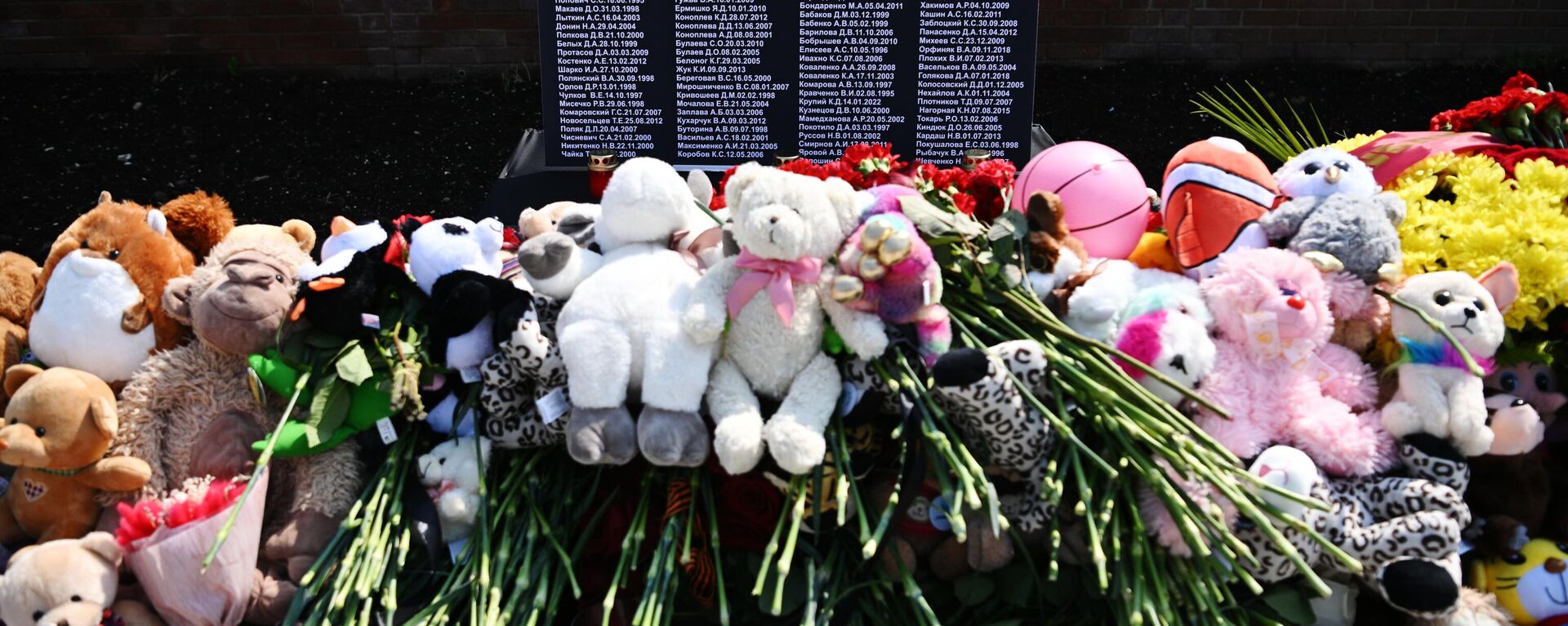https://sputnikglobe.com/20230927/with-warm-heart-and-cold-mind-how-russian-volunteers-help-residents-of-liberated-lugansk-villages-1113690358.html
With Warm Heart and Cold Mind: How Russian Volunteers Help Residents of Liberated Lugansk Villages
With Warm Heart and Cold Mind: How Russian Volunteers Help Residents of Liberated Lugansk Villages
Sputnik International
No food, no electricity, no medicine, no clean water - in many recently liberated settlements of the Lugansk People's Republic (LPR), people are not living, they are surviving. And they are immensely grateful for any help they receive. The volunteers of the Russian Humanitarian Mission are actively working in the conflict zone. Their credo is to work where others cannot go. This Sputnik report sheds light on their efforts.
2023-09-27T07:00+0000
2023-09-27T07:00+0000
2023-09-27T07:00+0000
russia's special operation in ukraine
ukrainian crisis
ukrainian conflict
lugansk
russia
donetsk
humanitarian aid
humanitarian crisis
civilians
shelling
https://cdn1.img.sputnikglobe.com/img/07e7/09/1a/1113689880_0:500:2730:2036_1920x0_80_0_0_58aed0c61c9659e6cb409443f6d27623.jpg
The volunteers of the Russian Humanitarian Mission are actively working in the conflict zone. Their credo is to work where others cannot go. This Sputnik report sheds light on their efforts.Aiding InfantsWe leave Donetsk early in the morning for the Lugansk People's Republic (LPR). Daylight is getting shorter, and we have several remote locations to visit today. We are not going empty-handed: we have about 200 food kits, generators, and medical equipment on pallets in the GAZelle cargo van. Each kit is designed to feed a family of three. The boxes contain cereal, pasta, canned meat, and condensed milk. The Russian Humanitarian Mission is particularly proud of its water filters, which can purify 25,000 liters of water.Our first stop was the Lugansk Republican Clinical Hospital, where a perinatal center has been established. We brought screening and diagnostic equipment and, most importantly, a supply of a special protein-free formula for newborns with a rare genetic condition called phenylketonuria. Simply put, it's a protein intolerance. These babies cannot be fed breast milk.Humanitarian workers recall how they traveled from Donetsk to Kherson last year because a child in that city had the same diagnosis. They admit that working with children is the most emotionally challenging. Unlike many adults, they are not to blame for their condition.A Village Reduced to a Single StreetWe left Lugansk and headed west. The Lugansk People's Republic has been almost completely liberated. The Russian Army managed to drive out the enemy, who didn't always cling to populated areas as stubbornly as in the Donetsk People's Republic. However, there are exceptions - Severodonetsk, Lisichansk, Popasnaya, and Rubezhnoye. The Ukrainian Armed Forces held on to these cities, usually taking cover in urban areas. Meanwhile, they quickly abandoned the smaller villages, often covering them with artillery fire after leaving.Only one street remains standing in the village of Orekhovo. Everything else has been reduced to rubble, with not a single intact house in sight. Now only 44 residents remain. It takes about an hour for the humanitarian GAZelle to gather them. The sun is scorching and there is little shade; people remain at home. We distribute food kits and load a gasoline generator into the vehicle of a local pensioner. They use the generator as a "public outlet" to charge cell phones and flashlights.Hearts and MindsOnly 380 residents remain in Nizhneye, and about half of them come out to meet the humanitarian workers. They surround the GAZelle, collect the aid packages and express their heartfelt gratitude. The Ukrainian shelling did not seriously damage the village. The villagers themselves have gradually rebuilt what the artillery destroyed during their frequent community work days. They rebuilt the ambulance station practically from scratch. However, they still lack construction materials for the kindergarten. Construction and utility workers cannot reach the village because of the poor roads. And here, as in Orekhovo and dozens of other villages in the Lugansk region, there is no electricity.After we finish in Nizhneye, we go to Metelkino. We need to provide targeted assistance to the Goncharov family - deliver a generator to them. The yard of their house was hit at least 18 times, and they spent many months in the basement. The head of the family, Kirill, along with his wife, Irina, and their two children, Prokhor and Kira, couldn't take it anymore, so they moved to Lugansk and rented an apartment. However, their parents have firmly refused to join them and are asking for help with electricity.But getting to Metelkino is not so easy. The only way is through Lisichansk, a restricted city, where entry is possible only with proper residence registration or special permission from the commandant's office. After more than an hour of waiting for orders from headquarters, we decided to return. Kirill Goncharov has a car and offers to drive us himself. We unloaded the generator in front of their rented house, presented toys to Kira and Prokhor, and drove back to Donetsk. An 18-hour workday comes to an end.Sergey recalls an incident when he gave a package of food to a man who had lost his home in Volnovakha. The man looked at him with contempt and said, "I won't thank you. I won't thank your army. I won't thank your authorities." The experienced humanitarian worker remained silent and listened - in moments like this, you have to let a person pour out his heart. Then the man burst into tears, spoke rapidly and incoherently for a long time. And then suddenly he clung to Sergey and cried, "Thank you, thank you." They parted as friends.To deal with such situations, one needs not only a warm heart and a cold mind, but also immense experience. And the volunteers of the Russian Humanitarian Mission have a wealth of experience that spans five lifetimes.
https://sputnikglobe.com/20230922/teenage-girl-pleads-un-to-stop-ukraine-from-killing-innocent-children-with-western-weapons-1113591308.html
https://sputnikglobe.com/20230727/dpr-head-unveils-shocking-death-toll-9-years-of-ukraines-shelling-killed-228-children-1112180884.html
lugansk
russia
donetsk
Sputnik International
feedback@sputniknews.com
+74956456601
MIA „Rosiya Segodnya“
2023
Andrey Kots
https://cdn1.img.sputnikglobe.com/img/07e7/09/0d/1113345217_428:0:2132:1704_100x100_80_0_0_572c3cfc2b7e5fdab0f340359bd4760b.jpg
Andrey Kots
https://cdn1.img.sputnikglobe.com/img/07e7/09/0d/1113345217_428:0:2132:1704_100x100_80_0_0_572c3cfc2b7e5fdab0f340359bd4760b.jpg
News
en_EN
Sputnik International
feedback@sputniknews.com
+74956456601
MIA „Rosiya Segodnya“
Sputnik International
feedback@sputniknews.com
+74956456601
MIA „Rosiya Segodnya“
Andrey Kots
https://cdn1.img.sputnikglobe.com/img/07e7/09/0d/1113345217_428:0:2132:1704_100x100_80_0_0_572c3cfc2b7e5fdab0f340359bd4760b.jpg
nizhneye, kots, humanitarian kits, humanitarian crisis, humanitarian aid, humanitarian mission, ukrainian crisis, failed counteroffensive, ukrainian counteroffensive, foiled counteroffensive, counteroffensive attempt, thwarted counteroffensive, counteroffensive effort, civilian infrastructure, civilians suffer, help civilians, ukraine kills civilians, russia helps civilians, russian aid to civilians, aid to civilians, aid for civilians, russian aid for civilians, russia aids civilians, russia saves civilians
nizhneye, kots, humanitarian kits, humanitarian crisis, humanitarian aid, humanitarian mission, ukrainian crisis, failed counteroffensive, ukrainian counteroffensive, foiled counteroffensive, counteroffensive attempt, thwarted counteroffensive, counteroffensive effort, civilian infrastructure, civilians suffer, help civilians, ukraine kills civilians, russia helps civilians, russian aid to civilians, aid to civilians, aid for civilians, russian aid for civilians, russia aids civilians, russia saves civilians
With Warm Heart and Cold Mind: How Russian Volunteers Help Residents of Liberated Lugansk Villages
No food, no electricity, no medicine, no clean water - in many recently liberated settlements of the Lugansk People's Republic (LPR), people are not living, they are surviving. And they are immensely grateful for any help they receive.
The volunteers of the Russian Humanitarian Mission are actively working in the conflict zone. Their credo is to work where others cannot go. This Sputnik report sheds light on their efforts.
We leave Donetsk early in the morning for the Lugansk People's Republic (LPR). Daylight is getting shorter, and we have several remote locations to visit today. We are not going empty-handed: we have about 200 food kits, generators, and medical equipment on pallets in the GAZelle cargo van. Each kit is designed to feed a family of three. The boxes contain cereal, pasta, canned meat, and condensed milk. The Russian Humanitarian Mission is particularly proud of its water filters, which can purify 25,000 liters of water.
"This is a Russian development that purifies any water, even from puddles," explains Dmitry Nasonov, RHM's chief logistics specialist. "It removes 99 percent of harmful impurities and bacteria. Such filters are in great demand. In liberated villages, people often have to drink tap water, which can contain not only impurities, but also rust, which can damage the stomach. They are waiting for us, but first we have to take care of the little ones."
Our first stop was the Lugansk Republican Clinical Hospital, where a perinatal center has been established. We brought
screening and diagnostic equipment and, most importantly, a supply of a special protein-free formula for newborns with a rare genetic condition called phenylketonuria. Simply put, it's a protein intolerance. These babies cannot be fed breast milk.
"If they don't get special protein-free food, they become disabled. Phenylketonuria mainly affects the brain. These children are significantly delayed in their mental development. We currently have 18 children with this diagnosis in our care. They come from all over the LPR. There is only one company in Russia that produces such food, so we need it. And it is very difficult to get them without prior request," said Elena Yeremenko, a medical laboratory assistant at the Medical Genetics Center.
Humanitarian workers recall how they traveled from Donetsk to Kherson last year because a child in that city had the same diagnosis. They admit that working with children is the most emotionally challenging. Unlike many adults, they are not to blame for their condition.
A Village Reduced to a Single Street
We left Lugansk and headed west. The Lugansk People's Republic has been
almost completely liberated. The Russian Army managed to drive out the enemy, who didn't always cling to populated areas as stubbornly as in the Donetsk People's Republic. However, there are exceptions - Severodonetsk, Lisichansk, Popasnaya, and Rubezhnoye. The Ukrainian Armed Forces held on to these cities, usually taking cover in urban areas. Meanwhile, they quickly abandoned the smaller villages, often covering them with artillery fire after leaving.
Only one street remains standing in the village of Orekhovo. Everything else has been reduced to rubble, with not a single intact house in sight. Now only 44 residents remain. It takes about an hour for the humanitarian GAZelle to gather them. The sun is scorching and there is little shade; people remain at home. We distribute food kits and load a gasoline generator into the vehicle of a local pensioner. They use the generator as a "public outlet" to charge cell phones and flashlights.
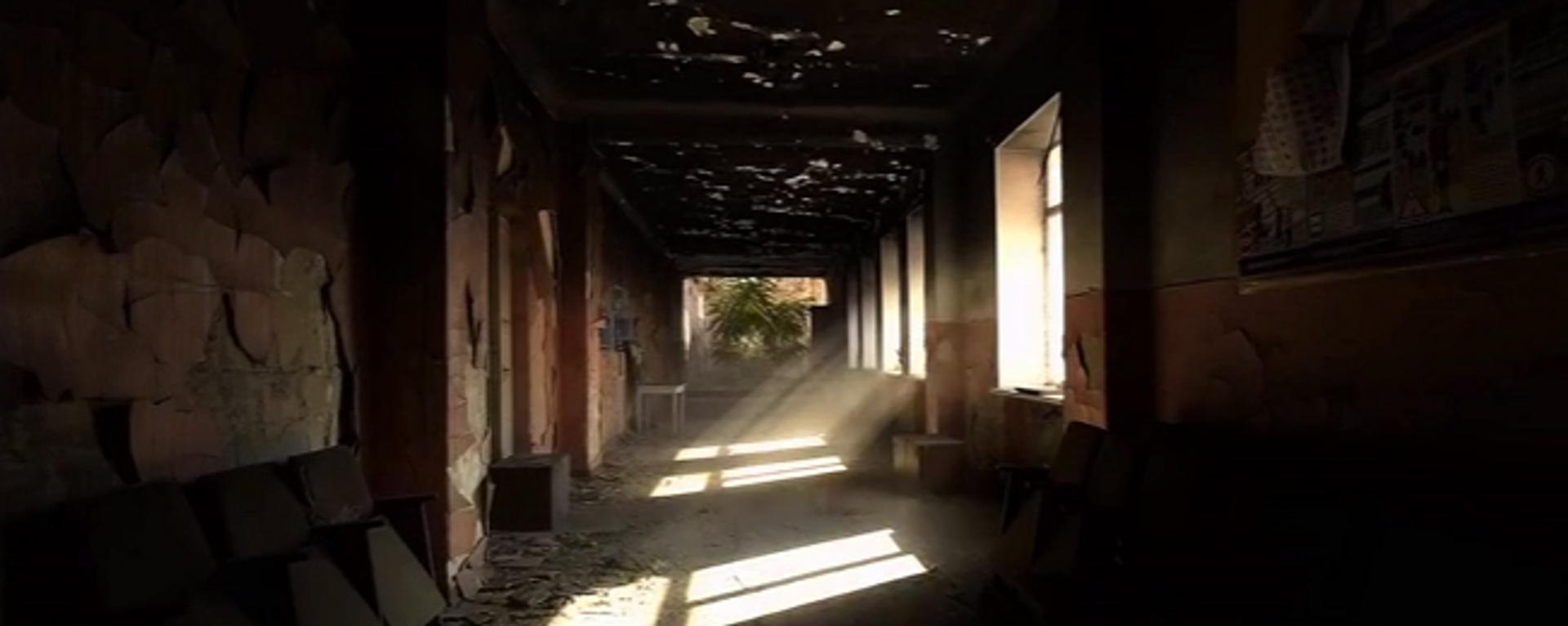
22 September 2023, 17:35 GMT
"Our biggest problem here is the lack of electricity," the residents of Orekhovo say. "And we need gasoline for the generators. One liter costs 60 rubles. There is a schoolgirl in the village who needs to be taken to school. Public transportation does not come here - no buses or minibuses. There is only one car for 11 households. We take turns using it to go to the nearest store in Kirovsk. Bread is delivered twice a month - and that's about it. Russian soldiers come to our aid. They help us with food and medicine. As for the Ukrainians who were driven out of here in May-June 2022, they could not care less about us. As soon as they left, they immediately shelled us."
Only 380 residents remain in Nizhneye, and about half of them come out to meet the humanitarian workers. They surround the GAZelle, collect the aid packages and express their heartfelt gratitude. The
Ukrainian shelling did not seriously damage the village. The villagers themselves have gradually rebuilt what the artillery destroyed during their frequent community work days. They rebuilt the ambulance station practically from scratch. However, they still lack construction materials for the kindergarten. Construction and utility workers cannot reach the village because of the poor roads. And here, as in Orekhovo and dozens of other villages in the Lugansk region, there is no electricity.
"At least we have enough food and water," sighs resident Julia Kanibor. "We tend our gardens, and many of us have wells and springs. But we've been without electricity for a year and a half. We use candles and torches. Fortunately, we have enough batteries. We have two stores and they are replenished frequently. But we have nothing to complain about. The neighboring Svetlichnoye was almost completely destroyed and many of its residents moved here. Even the locals who evacuated long ago are slowly returning. After all, this is our home."
After we finish in Nizhneye, we go to Metelkino. We need to provide targeted assistance to the Goncharov family - deliver a generator to them. The yard of their house was hit at least 18 times, and they spent many months in the basement. The head of the family, Kirill, along with his wife, Irina, and their two children, Prokhor and Kira, couldn't take it anymore, so they moved to
Lugansk and rented an apartment. However, their parents have firmly refused to join them and are asking for help with electricity.
But getting to Metelkino is not so easy. The only way is through Lisichansk, a restricted city, where entry is possible only with proper residence registration or special permission from the commandant's office. After more than an hour of waiting for orders from headquarters, we decided to return. Kirill Goncharov has a car and offers to drive us himself. We unloaded the generator in front of their rented house, presented toys to Kira and Prokhor, and drove back to Donetsk. An 18-hour workday comes to an end.
"These are fulfilling tasks," says Sergey Shevchuk, CEO of RHM, with a weary smile. "A humanitarian volunteer must have a warm heart and a cold mind. As cliché as it may sound, our motivation is the desire to help people. We've been in the conflict zone since March 2022. When it all started, we collected about 40 tons of food. The most painful impression was from Volnovakha, our first area of work. There was devastating destruction, frightened people who spoke the same language as us. We've seen it all - from Syria to Yemen to Latin America, in wars, earthquakes and technological disasters. But over time, we got involved here, too. In this kind of work, it's best to keep your emotions in check."
Sergey recalls an incident when he gave a package of food to a man who had lost his home in Volnovakha. The man looked at him with contempt and said, "I won't thank you. I won't thank your army. I won't thank your authorities." The experienced humanitarian worker remained silent and listened - in moments like this, you have to let a person pour out his heart. Then the man burst into tears, spoke rapidly and incoherently for a long time. And then suddenly he clung to Sergey and cried, "
Thank you, thank you." They parted as friends.
To deal with such situations, one needs not only a warm heart and a cold mind, but also immense experience. And the volunteers of the Russian Humanitarian Mission have a wealth of experience that spans five lifetimes.
